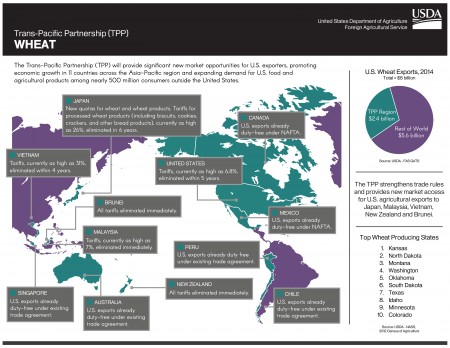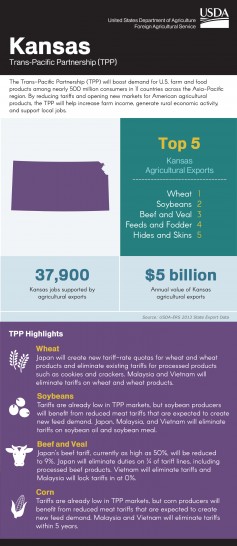Breadcrumb
- Home
- Recent news stories
- Trans-Pacific Partnership will benefit Kansas wheat farmers

“Asia is a growing regional market and this agreement has the potential to increase economic opportunity and wheat demand even in countries where we already have duty free access,” said USW President Alan Tracy. “That is critically important because our competitors like Australia are moving ahead with bilateral agreements that eliminate tariffs on wheat imports with countries like Vietnam. The high standards in the TPP agreement should help us be more competitive and hopefully lead to even more opportunity for our wheat as new countries join TPP in the future.”
“Trade agreements are essential for U.S. wheat farmers with more than 50 percent of our crop heading overseas. Concluding TPP negotiations is a step in the right direction. My fellow farmer-leaders and I look forward to reviewing the final text and working with Congress to determine how this will impact U.S. wheat farmers,” commented NAWG President, Brett Blankenship, wheat grower from Washtucna, Wash.
With domestic wheat consumption relatively stable, the largest potential growth lies in developing markets with rising middle classes – like those in Southeast Asia that are included in the TPP. However, these agreements also include some of the most stable customers, like Japan, where wheat is a very politically sensitive crop.

Significant new market opportunities will arise for Kansas wheat with the final passage of TPP. Japan will issue new tariff-rate quotas for wheat and wheat products within six years, Vietnam will eliminate tariffs that go as high as 31% within four years and three other countries will eliminate all tariffs immediately.
Currently 37,900 Kansas jobs are supported by agricultural exports, which reaches a total value of approximately $5 billion. The TPP is expected to help bolster farm income, generate rural economic activity and support local jobs. The U.S. presently trades 85% of agricultural exports worth $58.8 billion with Trans Pacific countries, and experts predict substantial growth with the enactment of the TPP.
For all these reasons, the U.S. wheat industry is unified in its support of trade promotion authority as a means to negotiate – and complete – comprehensive trade agreements. As published on the U.S. Trade Representative website, “With Trade Promotion Authority, the United States will be able to pursue 21st century trade agreements that support and create U.S. jobs while helping American manufacturers, service providers, farmers and ranchers increase U.S. exports and compete in a highly competitive, globalized economy.”
USW and NAWG thank Ambassador Froman and the entire U.S. team focused on agricultural issues for their leadership and hard work in concluding these important TPP negotiations. Find more information on trade promotion authority and the wheat industry’s work on trade policy issues at www.wheatworld.org/trade or http://www.uswheat.org/policy.
